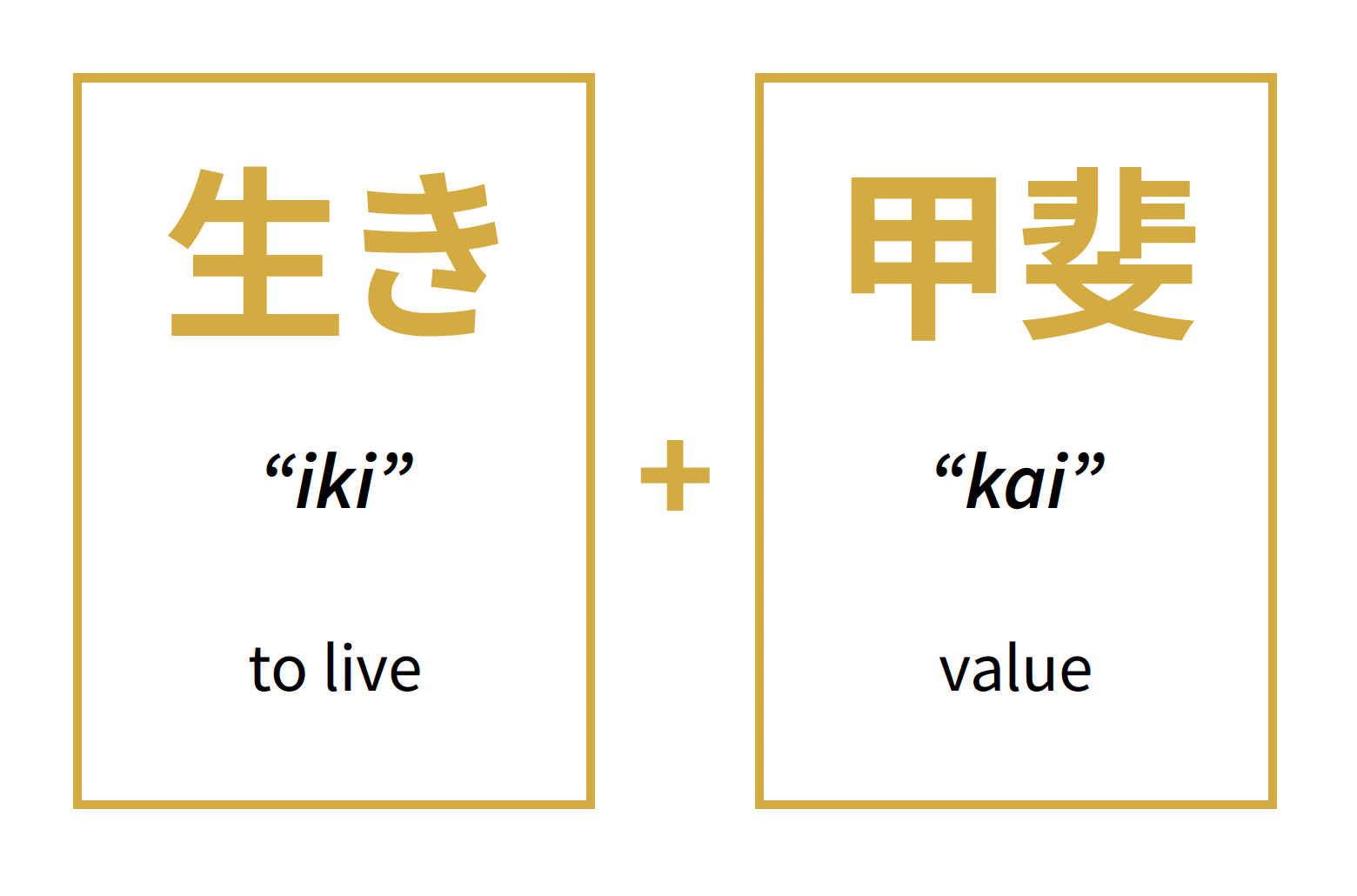IKIGAI Coaching Education
What does true Ikigai offer for coaches?
The coaching and professional development field is full of training programmes and certifications. Many of these programmes offer new tools, models and methods aimed at improving the way we support clients and mentees. Often, they promise greater efficiency or impact.
True Ikigai, however, touches all areas of life. It fosters a holistic understanding of meaning and fulfilment. In contrast, Andrés Zuzunaga's well-known 'four-circle model' (often mislabelled as Ikigai) offers useful tools for vocational orientation, but focuses largely on external and material aspects.
True Ikigai asks about the way of being, not just the doing. For coaches, integrating Ikigai can enable a deeper, more comprehensive approach to guiding others towards a meaningful life.
The Ikigai Doppelgänger – the false IKIGAI
The diagram widely shared under the name "IKIGAI" was originally developed by Andrés Zuzunaga under the name Propósito ("Purpose"). It has since circulated millions of times without attribution, and without any connection to the Japanese concept of Ikigai. We therefore speak of a double misrepresentation: Zuzunaga receives no credit, and the model has nothing to do with the cultural roots of Ikigai – despite being used in countless coach trainings and certification programs.
The Propósito Diagram by Andrés Zuzunaga – which he never called Ikigai. © Cosmograma
A Live Course about the True and Authentic Meaning of Ikigai
At Finde Zukunft, we have engaged in many years of research into the original writings of Mieko Kamiya, the pioneer of Ikigai psychology. Based on her work, and in dialogue with Ken Mogi, we developed an Ikigai model and training course that reflects the original meaning of Ikigai.
Our model integrates Kamiya’s deep existential dimensions with Ken Mogi’s practical, everyday-oriented pillars. It aims to offer a comprehensive understanding of Ikigai – one that supports personal meaning as well as daily wellbeing.
IKIGAI for Coaches
Ikigai finds us
Japanese philosophy makes it clear: Ikigai is not something we can discover by filling out worksheets or pushing ourselves in seminars. In the spirit of Viktor Frankl, meaning is not found by turning inward in isolation, but by stepping beyond ourselves and engaging with life.
In the Japanese sense, Ikigai – the things that make life worth living – are found along the way. They may be small or large. But more importantly, Ikigai teaches us that such distinctions lose their weight. As Ken Mogi puts it in his book Finding Your Life Purpose with Ikigai, Ikigai allows us to become more open, creative, and appreciative of what surrounds us.
Ikigai looks at what already exists
Mieko Kamiya, inspired by Viktor Frankl, differentiated between the source of Ikigai and the feeling of Ikigai (Ikigai-kan).
“There are two ways of using the word ‘Ikigai’: it can refer to the source or object that makes life worth living – as in ‘This child is my Ikigai’ – or it can refer to the inner state of experiencing Ikigai. The latter is what Frankl called the ‘sense of meaning.’ I will refer to this as ‘Ikigai-kan’ to distinguish it.” – Mieko Kamiya
Ikigai doesn’t ask "What", it asks "How"
One of the essential differences between western purpose models and Japanese Ikigai lies in the question itself.
While most western approaches – including the Venn diagram – focus on the what (activity, achievement, profession), Ikigai is a question of how we want to live. This shift in focus changes everything.
We’ve seen this shift bring a deep sense of relief to participants in many of our courses at Finde Zukunft. It opens the path to a more sustainable, meaningful, and integrated way of living.
Ikigai is about Being – not Doing
„Your career does not visit you when you are hospitalized.“
The authentic meaning of Ikigai is ontological in nature: it is about being, not doing. It asks:
Who are you? What is your worth – even when you do nothing?
This deeper understanding shifts the focus from performance to presence, from output to inner alignment.
Therefore Ikigai fosters eudaimonic wellbeing – a lasting, values-based sense of meaning – rather than hedonic wellbeing, which centers on pleasure and short-term satisfaction.
This distinction is supported by research such as Gilbert's study on how to spend money and various other resilience studies.
This is essential for coaches to provide coaching and counseling that goes beyond the surface.
For coaches, this means that integrating Ikigai can enable a deeper and more comprehensive approach to guiding others toward a meaningful life.
Why this matters for coaches
This difference – between "what" and "how" – also changes how we support others.
Many people today are affected by chronic stress and exhaustion, often resembling symptoms of burnout. The pandemic has intensified this. Tania Singer from the Max Planck Institute for Human Cognitive and Brain Sciences described it like this:
“I compare it to a rubber band. If you stretch it once and let go, it snaps back. But if you stretch it over and over, it eventually loses its elasticity. That’s what chronic stress does – it’s a cumulative effect that wears us down.”
– Tania Singer, CovSocial Interview, 2022
Finding Japanese Cultural Elements to foster IKIGAI: The IKIGAI Compass ©
A gateway into Ikigai is through Japanese cultural values. One of them is harmony – already enshrined in Japan’s first constitution.
We developed the Ikigai Compass to translate these values into a practical structure for self-reflection. It helps connect Ikigai with nature, with embodied perception (Ikigai-kan) and resonance – one of Kamiya’s original Ikigai dimensions.
The compass builds on values central to Japanese culture:
Attention
Equanimity
Values
Harmony
Trust
Respect
Uniqueness
Time & Space
The integrated IKIGAI Model ©
Kamiya proposed seven dimensions of Ikigai that describe the lived experience of meaning:
Life satisfaction
Personal growth and transformation
Future orientation
Resonance
Freedom
Self-realization
Meaning and value
Ken Mogi complements this with five (or six) practical pillars. After exchanging thoughts with him, we confirmed that the sixth – harmony – also belongs.
At Finde Zukunft, we developed a model that combines Kamiya’s deep dimensions with Mogi’s everyday wisdom. It supports a grounded, applicable understanding of Ikigai.
Ikigai and Self-Care
Self-care and self-compassion are often mentioned, but rarely embodied. In its original sense, self-care is especially relevant for those in caring professions – therapists, coaches, educators, and others.
Ikigai, through Kamiya’s lens, invites us to reflect on what really sustains us:
A deeper life satisfaction
The capacity for change
Hope for the future
Resonance with others
Freedom
Self-actualization
A sense of meaning
Mogi’s pillars offer a complementary perspective – one of simplicity, beauty in the ordinary, and mindful presence.
One-on-One Ikigai Coaching
If you're seeking a personal and deep approach to Ikigai, you can book a discovery session with us.
The Ikigai Book
After years of courses and seminars, we have now published a book:
Ikigai: The Secret of the Little Things, by Klaus Motoki Tonn.
The book picks up where Ken Mogi’s leaves off – extending his ideas into practical tools. In agreement with Mogi, we developed six core coaching questions based on his pillars and combined them with Kamiya’s seven dimensions to form our own model.
The Original: Learn Ikigai and become a Certified IKIGAI Coach
Experience Ikigai with depth – guided by Motoki Tonn, one of two officially certified Ikigai coaches in Germany.
At Finde Zukunft, we offer three formats:
Ikigai 1:1 Coaching
For those seeking personal clarity and depth.Ikigai Live Course – Personal
A group program for those wishing to live with intention and meaning.
Frequently Asked Questions on Ikigai Coaching & Education
What makes the Ikigai Coaching education at Finde Zukunft unique?
Our approach is rooted in the original writings of Mieko Kamiya and integrates key principles from Japanese philosophy, logotherapy, ACT, and systems-based models such as IFS. Unlike mainstream programs based on the misattributed Venn diagram, we offer a deep, multidimensional exploration of Ikigai as a way of being.
Is the training available in English?
Yes. We offer a new international English-language cohort every quarter. On request, we also organize Spanish-language cohorts.
How many people are in each group?
Each group is intentionally kept small – usually 5 to 8 participants – to ensure depth of dialogue, reflection, and connection.
Can I use the materials professionally?
All slides and learning resources are available under two license formats:
Personal use license for private reflection
Professional license for certified coaching or training use
All materials, including photographs and visual frameworks, are original creations of Finde Zukunft and are fully copyrighted.
Do participants receive supervision?
Yes. Every professional participant receives individual 1:1 supervision sessions with Motoki Tonn, one of the few certified Ikigai Coaches and author of Ikigai: The Secret of the Little Things.
Who are the course facilitators?
Our faculty includes logotherapists, certified Ikigai coaches, and professionals with over 20 years of experience in corporate leadership, entrepreneurship, mental health, and social innovation.
How often does the cohort meet?
Each cohort meets at least three times over the course of a quarter. Additional peer-based reflection and integration formats are offered throughout.
What background materials are included?
Participants receive access to original English translations from Mieko Kamiya’s work, carefully contextualized for modern use. We explore the connection between Ikigai and anthropology, psychology, and leadership – while honoring the cultural roots and spiritual depth of the concept.



